Dremel 276T6 Handleiding
Dremel
Schroefmachine
276T6
Bekijk gratis de handleiding van Dremel 276T6 (92 pagina’s), behorend tot de categorie Schroefmachine. Deze gids werd als nuttig beoordeeld door 86 mensen en kreeg gemiddeld 4.6 sterren uit 43.5 reviews. Heb je een vraag over Dremel 276T6 of wil je andere gebruikers van dit product iets vragen? Stel een vraag
Pagina 1/92

MultiPro™
Rotary Tool Owner’s Manual
Models 275T6 (F013027503)
285T6 (F013028503)
395T6 (F013039504)
HONESTLY NOW … Have you
read
this OWNER’S MANUAL?
•Safety
•Assembly
•Operation
• Maintenance
•Attachment Information
•Accessory Information
•Warranty
• Service Parts
2610925474 10/04 Printed in Mexico
P.O. Box 1468
Racine, Wisconsin 53401
2
4
6
8
10
1-800-437-3635
http://www.dremel.com
Parlez-vous français?
Voir page 27
¿Habla español?
Vea página 55
©
Robert Bosch Tool
Corporation
2001
All Rights Reserved
Dremel brand products are manufactured and sold by the
Dremel Division of Robert Bosch Tool Corporation
DM 2610925474 10-04 10/19/04 3:39 PM Page 1

Page 2
Power Tool Safety Rules
Read and understand all instructions. Failure to follow all instructions listed below, may
result in electric shock, fire and/or serious personal injury.
SAVE THESE INSTRUCTIONS
!
WARNING
Work Area
Keep your work area clean and well lit. Cluttered
benches and dark areas invite accidents.
Do not operate power tools in explosive atmospheres,
such as in the presence of flammable liquids, gases,
or dust. Power tools create sparks which may ignite the
dust or fumes.
Keep by-standers, children, and visitors away while
operating a power tool. Distractions can cause you to
lose control.
Electrical Safety
Double Insulated tools are equipped with a polarized
plug (one blade is wider than the other.) This plug
will fit in a polarized outlet only one way. If the plug
does not fit fully in the outlet, reverse the plug. If it
still does not fit, contact a qualified electrician to
install a polarized outlet. Do not change the plug in
any way. Double Insulation eliminates the need for
the three wire grounded power cord and grounded
power supply system. Before plugging in the tool, be
certain the outlet voltage supplied is within the voltage
marked on the nameplate. Do not use “AC only” rated
tools with a DC power supply.
Avoid body contact with grounded surfaces such as
pipes, radiators, ranges and refrigerators. There is an
increased risk of electric shock if your body is
grounded. If operating the power tool in damp locations
is unavoidable, a Ground Fault Circuit Interrupter must
be used to supply the power to your tool. Electrician’s
rubber gloves and footwear will further enhance your
personal safety.
Don't expose power tools to rain or wet conditions.
Water entering a power tool will increase the risk of
electric shock.
Do not abuse the cord. Never use the cord to carry the
tools or pull the plug from an outlet. Keep cord away
from heat, oil, sharp edges or moving parts. Replace
damaged cords immediately. Damaged cords increase
the risk of electric shock.
When operating a power tool outside, use an outdoor
extension cord marked "W-A" or "W." These cords are
rated for outdoor use and reduce the risk of electric
shock. Refer to “Recommended sizes of Extension
Cords” in the Accessory section of this manual.
Personal Safety
Stay alert, watch what you are doing and use common
sense when operating a power tool. Do not use tool
while tired or under the influence of drugs, alcohol, or
medication. A moment of inattention while operating
power tools may result in serious personal injury.
Dress properly. Do not wear loose clothing or jewelry.
Contain long hair. Keep your hair, clothing, and gloves
away from moving parts. Loose clothes, jewelry, or
long hair can be caught in moving parts. Keep handles
dry, clean and free from oil and grease.
Avoid accidental starting. Be sure switch is “OFF”
before plugging in. Carrying tools with your finger on
the switch or plugging in tools that have the switch
“ON” invites accidents.
Remove adjusting keys or wrenches before turning the
tool “ON”. A wrench or a key that is left attached to a
rotating part of the tool may result in personal injury.
Do not overreach. Keep proper footing and balance at
all times. Proper footing and balance enables better
control of the tool in unexpected situations.
Use safety equipment. Always wear eye protection.
Dust mask, non-skid safety shoes, hard hat, or hearing
protection must be used for appropriate conditions.
Tool Use and Care
Use clamps or other practical way to secure and
support the workpiece to a stable platform. Holding
the work by hand or against your body is unstable and
may lead to loss of control.
Do not force tool. Use the correct tool for your
application. The correct tool will do the job better and
safer at the rate for which it is designed.
Do not use tool if switch does not turn it “ON” or
“OFF”. Any tool that cannot be controlled with the
switch is dangerous and must be repaired.
Disconnect the plug from the power source before
making any adjustments, changing accessories, or
storing the tool. Such preventive safety measures
reduce the risk of starting the tool accidentally.
Store idle tools out of reach of children and other
untrained persons. Tools are dangerous in the hands of
untrained users.
Maintain tools with care. Keep cutting tools sharp and
clean. Properly maintained tools, with sharp cutting
edges are less likely to bind and are easier to control.
Any alteration or modification is a misuse and may
result in a dangerous condition.
Check for misalignment or binding of moving parts,
breakage of parts, and any other condition that may
affect the tools operation. If damaged, have the tool
serviced before using. Many accidents are caused by
poorly maintained tools. Develop a periodic
maintenance schedule for your tool.
DM 2610925474 10-04 10/19/04 3:39 PM Page 2

Page 3
Use only accessories that are recommended by the
manufacturer for your model. Accessories that may
be suitable for one tool, may become hazardous
when used on another tool.
Service
Tool service must be performed only by qualified
repair personnel. Service or maintenance performed by
unqualified personnel could result in a risk of injury. For
example: internal wires may be misplaced or pinched,
safety guard return springs may be improperly
mounted.
When servicing a tool, use only identical replacement
parts. Follow instructions in the Maintenance section
of this manual. Use of unauthorized parts or failure to
follow Maintenance Instructions may create a risk of
electric shock or injury. Certain cleaning agents such as
gasoline, carbon tetrachloride, ammonia, etc. may
damage plastic parts.
Accessories must be rated for at least the speed
recommended on the tool warning label. Wheels
and other accessories running over rated speed can
fly apart and cause injury.
Hold tool by insulated gripping surfaces when
performing an operation where the cutting tool may
contact hidden wiring or its own cord. Contact with
a "live" wire will make exposed metal parts of the tool
"live" and shock the operator. If cutting into existing
walls or other blind areas where electrical wiring may
exist is unavoidable, disconnect all fuses or circuit
breakers feeding this worksite.
Do not operate the flexible shaft with a sharp bend.
Over bending the shaft can generate excessive heat
on the jacket or hand piece. The recommended
minimum is 6" radius.
Always disconnect the power cord from the power
source before making any adjustments or attaching
any accessories. You may unexpectedly cause the
tool to start leading to serious personal injury.
Be aware of the switch location, when placing the
tool down or when picking the tool up. You may
accidentally activate the switch.
Always hold the hand piece firmly in your hands
during the start-up. The reaction torque of the motor,
as it accelerates to full speed, can cause the shaft to
twist.
Always wear safety goggles and dust mask. Use
only in well ventilated area. Using personal safety
devices and working in safe environment reduces risk
of injury.
After changing the bits or making any adjustments,
make sure the collet nut and any other adjustment
devices are securely tightened. Loose adjustment
device can unexpectedly shift, causing loss of control,
loose rotating components will be violently thrown.
Do not reach in the area of the spinning bit. The
proximity of the spinning bit to your hand may not
always be obvious.
Allow brushes to run at operating speed for at least
one minute before using wheel. During this time no
one is to stand in front or in line with the brush.
Loose bristles or wires will be discharged during the
run-in time.
Wire and bristle brushes must never be operated at
speeds greater than 15,000/min. Direct the
discharge of the spinning wire brush away from
you. Small particles and tiny wire fragments may be
discharged at high velocity during the “cleaning”
action with these brushes and may become imbedded
in your skin. Bristles or wires will be discharged from
the brush at high speeds.
Wear protective gloves and face shield with wire or
bristle brushes. Apply wire or bristle brushes lightly
to the work as only the tips of the wire/bristles do
the work. “Heavy” pressure on bristles will cause the
wire or bristle to become overstressed, resulting in a
wiping action and will cause the bristles/wire to be
discharged.
Carefully handle both the tool and individual
grinding wheels to avoid chipping or cracking.
Install a new wheel if tool is dropped while
grinding. Do not use a wheel that may be damaged.
Fragments from a wheel that bursts during operation
will fly away at great velocity possibly striking you or
bystanders.
Never use dull or damaged bits. Sharp bits must be
handled with care. Damaged bits can snap during
use. Dull bits require more force to push the tool,
possibly causing the bit to break.
Use clamps to support workpiece whenever
practical. Never hold a small workpiece in one hand
and the tool in the other hand while in use. Allow
for sufficient space, at least 6", between your hand
and the spinning bit. Round material such as dowel
rods, pipes or tubing have a tendency to roll while
being cut, and may cause the bit to “bite” or jump
toward you. Clamping a small workpiece allows you
to use both hands to control the tool.
Safety Rules for Rotary Tools
DM 2610925474 10-04 10/19/04 3:39 PM Page 3
Product specificaties
| Merk: | Dremel |
| Categorie: | Schroefmachine |
| Model: | 276T6 |
Heb je hulp nodig?
Als je hulp nodig hebt met Dremel 276T6 stel dan hieronder een vraag en andere gebruikers zullen je antwoorden
Handleiding Schroefmachine Dremel

14 Juni 2023

10 Juni 2023

3 April 2023

3 April 2023

3 April 2023

3 April 2023

3 April 2023

3 April 2023

3 April 2023
Handleiding Schroefmachine
- Mac Tools
- Bosch
- Mafell
- Black Decker
- Genesis
- Skil
- TAURUS Titanium
- Ferm
- Rodcraft
- Fieldmann
- DeWalt
- Einhell
- Cocraft
- Pansam
- Steren
Nieuwste handleidingen voor Schroefmachine
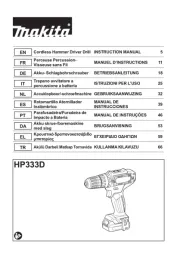
15 Juli 2025
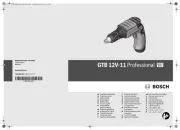
15 Juli 2025
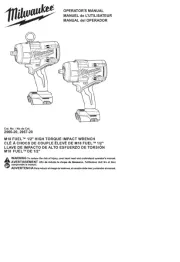
14 Juli 2025
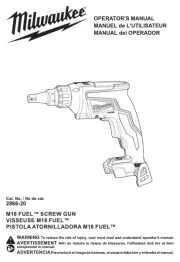
14 Juli 2025

5 Juli 2025
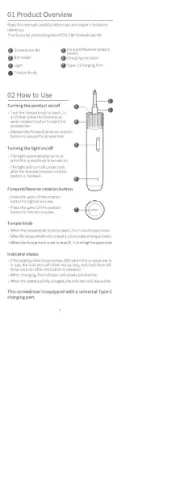
5 Juli 2025
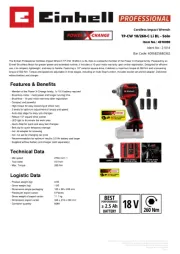
5 Juli 2025
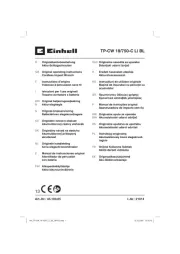
4 Juli 2025

4 Juli 2025

4 Juli 2025